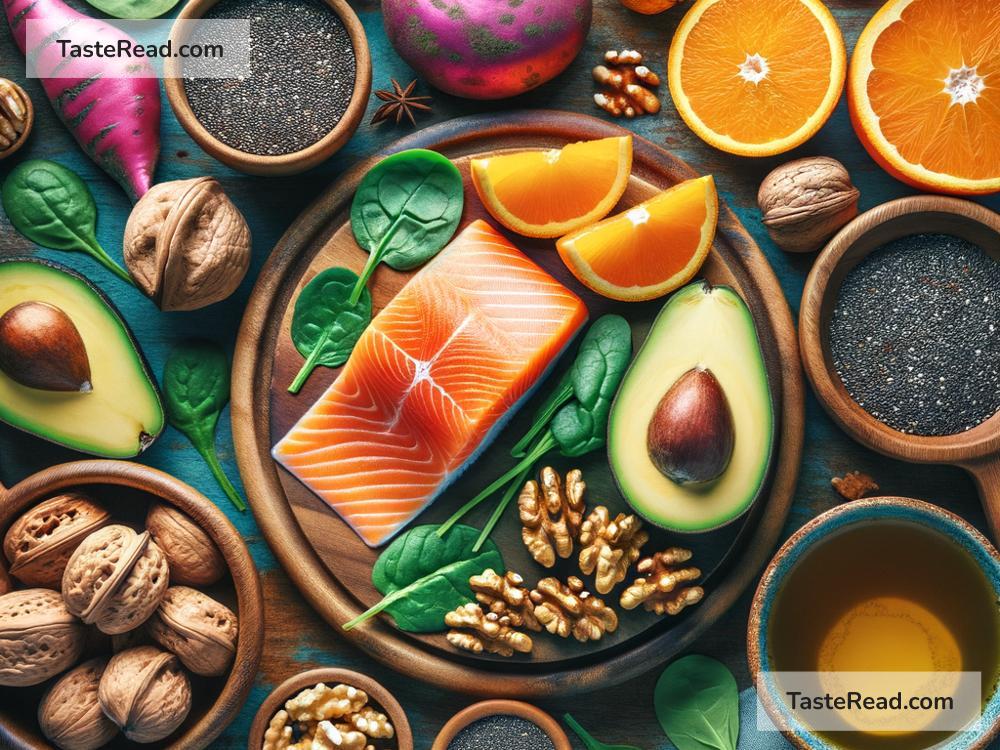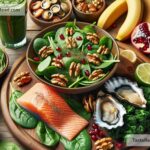Boosting Tendon Health Through Smart Food Choices: A Simple Guide
Our tendons may not get much attention, but they play a crucial role in our daily lives. Tendons are tough bands of tissue that connect muscles to bones, allowing us to move, lift, and perform physical activities. Healthy tendons mean better mobility, faster injury recovery, and improved overall well-being. If you’re looking for ways to support your tendons naturally, food is a great place to start. The right nutrition can strengthen tendons, help heal injuries, and keep them functioning at their best.
Here are some foods that promote tendon health — explained in simple terms:
1. Protein-Rich Foods
Protein is the building block of many tissues in the body, including tendons. Collagen, a key component of tendons, is made up of protein. Eating enough protein helps your body repair damaged tendons and build stronger connections between muscles and bones.
Foods high in protein:
– Eggs: Affordable and packed with high-quality protein.
– Chicken and turkey: Great lean protein options.
– Fish: Rich in omega-3s and protein, especially salmon and sardines.
– Greek yogurt & cottage cheese: A good source of protein and calcium.
– Beans and lentils: Perfect for plant-based protein.
Make sure to include a variety of protein-rich foods in your diet for healthy tendon repair and maintenance.
2. Collagen-Boosting Foods
Collagen is essential for strong tendons. It provides structure, flexibility, and elasticity to these tissues. Your body naturally produces collagen, but eating certain foods can encourage its production.
Foods that help boost collagen:
– Bone broth: A rich source of natural collagen, made by simmering animal bones in water.
– Citrus fruits (like oranges, lemons, and grapefruits): High in vitamin C, which helps your body make collagen.
– Berries (like strawberries, raspberries, and blueberries): Loaded with antioxidants and vitamin C.
– Garlic: Contains sulfur, which supports collagen production.
– Leafy greens (like spinach and kale): These are packed with nutrients that promote collagen formation.
Adding collagen-friendly foods to your diet can go a long way in keeping your tendons strong.
3. Vitamin C-Rich Foods
Vitamin C plays a vital role in repairing tendons and promoting collagen production. It also fights inflammation, which can occur due to tendon injuries or overuse.
Foods high in vitamin C:
– Citrus fruits (again, oranges and lemons lead the list).
– Bell peppers: Red, yellow, and green peppers are rich in vitamin C.
– Strawberries and kiwi: Great snacks loaded with this nutrient.
– Tomatoes: These are versatile and easy to add to meals.
A diet rich in vitamin C supports tendon health and helps you heal faster from injuries.
4. Omega-3 Fatty Acids
Omega-3s are healthy fats that reduce inflammation in the body. Tendon injuries often involve swelling and discomfort. Eating omega-3-rich foods can help lessen this inflammation and promote faster recovery.
Foods with omega-3s:
– Fatty fish (like salmon, mackerel, and tuna): These are among the best sources.
– Chia seeds and flaxseeds: Perfect for a plant-based omega-3 boost.
– Walnuts: A healthy snack packed with omega-3s.
– Avocados: Rich in good fats, including some omega-3s.
Omega-3s are excellent for reducing tendon inflammation and keeping them flexible.
5. Foods with Zinc and Magnesium
Zinc and magnesium are minerals that play a role in tissue repair and keeping tendons healthy. Zinc supports collagen synthesis, while magnesium is key for muscle and tendon function.
Foods rich in zinc and magnesium:
– Pumpkin seeds: A great snack loaded with both minerals.
– Nuts (like almonds and cashews): Full of magnesium and zinc.
– Whole grains (like oats and quinoa): Easy to cook and packed with nutrients.
– Shellfish (especially oysters): A top source of zinc.
– Dark chocolate: Yes, healthy dark chocolate can provide magnesium!
Incorporating these minerals into your diet can help your tendons stay strong and resilient.
6. Anti-Inflammatory Foods
Chronic inflammation can weaken tendons and increase the risk of injury. Filling your plate with anti-inflammatory foods can protect your tendons and decrease pain.
Best anti-inflammatory foods:
– Turmeric: The active compound, curcumin, is a powerful inflammation fighter.
– Ginger: Known for its soothing properties.
– Green tea: Contains antioxidants that support healthy tissue.
– Olive oil: A heart-healthy oil that also reduces inflammation.
These foods not only promote tendon health but also support your entire body.
7. Hydrating Foods
Staying hydrated is key for tendon flexibility and elasticity. Water keeps tendons supple and helps prevent injuries. Foods with high water content can support hydration.
Hydrating options include:
– Cucumbers: A crunchy snack packed with water.
– Watermelon: Sweet and hydrating fruit.
– Celery: Good for hydration and rich in nutrients.
Don’t forget to drink plenty of water alongside these foods to keep your tendons hydrated.
Final Thoughts
What you eat has a direct impact on tendon health. A balanced diet full of protein, vitamins, minerals, omega-3s, and anti-inflammatory foods can help your tendons stay strong, flexible, and resistant to injuries. Whether you’re an athlete, recovering from a tendon injury, or just looking to maintain mobility over time, these foods can make a big difference.
By incorporating these tendon-friendly options into your meals, you’re not just feeding your hunger — you’re investing in your body’s ability to move, heal, and stay active. So eat well, stay hydrated, and give your tendons the care they deserve!


